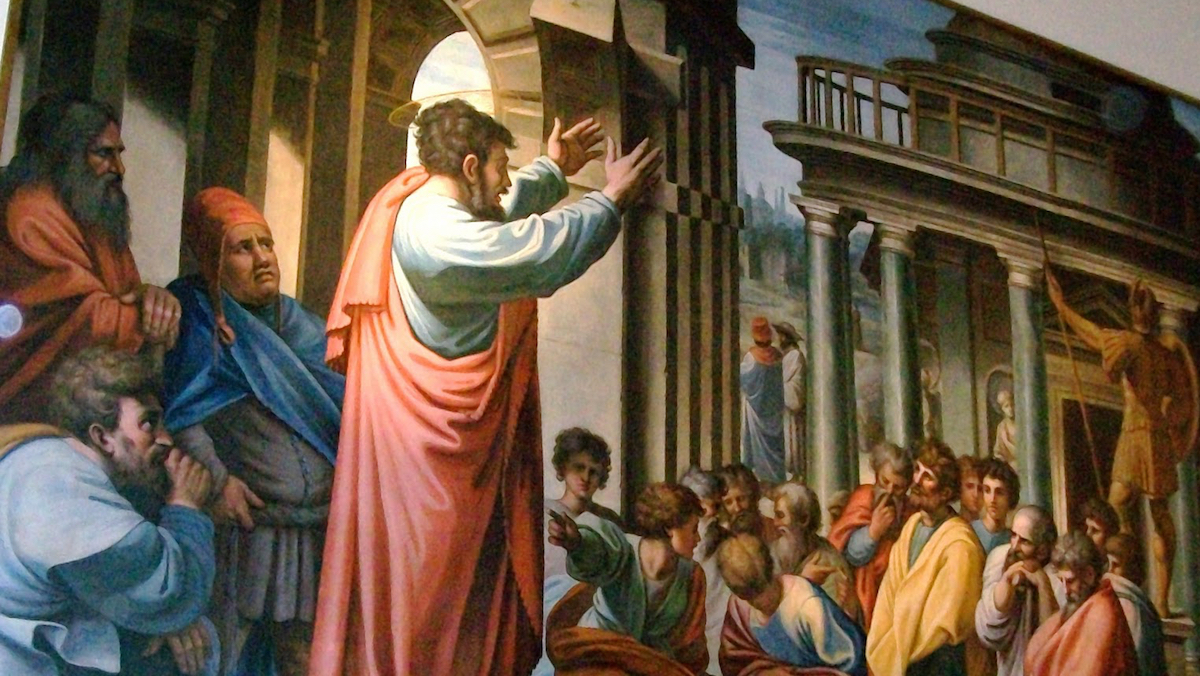Once upon a time a young woman gave birth to her first child, a beautiful baby boy, just one month after her husband had died in a tragic accident. The neighbors were all very concerned for the mother and child, and held a baby shower, bringing a variety of practical and valuable gifts: a used baby crib, toys, clothes, and a large quantity of food. After opening all the gifts, the young mother—brushing back her tears—said, “Thank you all so much. You’ve made a very difficult time a little easier,” and then she announced, “My son will be baptized next Sunday, and I’ve decided to name him Victor, after his father.” After all the guests had gone, there was one more knock at the door; it turned out to be the strange old man who lived alone at the end of the street. Everyone called him Doc Burns, even though he wasn’t a doctor, and since he kept to himself, few people had ever talked to him. The mysterious visitor said in a soft voice, “I’ve come to give you my gift for your son—a gift very different from the others you’ve received. I’ve come to grant you one wish for your son—anything at all—but you must make the wish before your son is baptized on Sunday. I promise you, I do have the power to grant your wish.” The mother wasn’t sure what to ask for, and she thought about it all week; finally, a moment before he was baptized, she whispered in her baby’s ear, “I wish that everyone in the world will love my Victor.”
The wish magically came true, just as Doc Burns had promised; Victor was so cute and lovable that everyone doted on him; people couldn’t resist hugging and touching him and giving him gifts. When Victor misbehaved, no one could really believe he was being naughty, and when his mother tried to correct him, all the adults told her she was being much too harsh and unfair. It wasn’t long before Victor was completely spoiled, and he was soon acting pridefully and treating almost everyone with scorn and contempt—except for Doc Burns; for some reason, he respected the old man, who was the only one who could reprimand the boy without making him sullen or upset. As a young man, Victor lived life in the fast lane—flaunting his expensive clothes that had been given to him by friends and even strangers, drinking, partying, and giving himself over completely to a life of pleasure and self-indulgence . . . until he finally admitted to himself that he hated every minute of it.
He was ashamed of how he had treated others and he was disgusted with himself and his empty and meaningless life, so he mixed a powerful poison with a glass of wine.
At that moment Doc Burns rushed into Victor’s room and knocked the glass from his hand, and then explained that he was responsible for Victor’s misery, as he had granted his mother’s wish many years ago. “I fulfilled your mother’s wish on the day of your baptism,” he said, “even though it was a foolish one—but suppose I offer you a new wish? Make it anything you want, but be careful, Victor—wishes have a way of coming true.” Victor answered sadly, “I don’t think you can give me anything I haven’t already had.” “Think again, my son,” said Doc Burns. “What is it that you need to be happy?” Victor thought about this very intently, and after several minutes he said, with tears in his eyes, “Please take away the old magic and give me a new wish. Instead of being loved, I ask for the ability to love everyone in the world.” “Excellent!” Doc Burns exclaimed as he embraced the sobbing young man. “Your wish is granted. Now things will go better for you.”
At first things were very rough for Victor; without his great charm, he lost most of his friends, some people started taking revenge on him for the sins he had committed against them, and when he was even thrown in jail for three months, no one cared or came to visit him. After being released, he was sick, lonely, and penniless—but thinking of someone other than himself for a change, he returned home to care for his ailing mother. For the first time Victor was truly able to return her love, without seeking anything for himself, and after his mother recovered, he took a job as a janitor in a nearby school. He worked hard, but more importantly, he opened his heart to everyone he met, especially the students, and soon everyone loved him—not because of any magic, but because he had become a very loving and giving person. Victor met a young widow with two children, married her, and became the husband and father they so greatly needed. For the rest of his life, Victor was poor in money, but rich in the things that mattered—for he had discovered that it’s our choice to love others that gives life its deepest meaning (White, Stories for Telling, p. 37).
It’s important for us to note that Jesus (John 13:31-33, 34-35) did not say to the apostles, “I give you a new commandment: make yourself lovable,” nor did He say, “This is how all will know that you are My disciples, if everyone loves and admires you.” We are not meant to spend our lives trying to make everyone love us; that’s a case of putting the cart before the horse. No, we are supposed to devote ourselves to loving others, even at the risk of being misunderstood or rejected—for that’s how we follow in Our Lord’s footsteps, that’s how we make ourselves loving persons, and that’s how we find the secret of a happy life.
Of all the people present in the upper room on the evening of Holy Thursday, only Judas had an unloving heart—and this led him not only to commit a terrible sin of betrayal, but later to hang himself in despair. Refusing to love ultimately ruins everything—but humbly opening our hearts to God’s love, and doing our best to share this love with others, leads to eternal happiness. The Book of Revelation (21:1-5) describes the joy of Heaven, where God wipes away every tear, freeing His people from pain and death, while making all things new. This is what our hearts yearn for, and choosing to love God and our neighbor makes this blessed destiny possible. It’s not always easy to follow the way of love as a disciple of Jesus; as Saints Paul and Barnabas (Acts 14:21-27) warned their converts, “It is necessary for us to undergo many hardships to enter the Kingdom of God.” Choosing to love makes us vulnerable to rejection—but such a choice is always worth the risk, for it conforms us more closely to Christ and increases our capacity for eternal happiness.
When Victor finally learned the importance of genuinely loving others, he also discovered the secret of true happiness. This is the most important lesson any of us can ever learn. By choosing to love others in Christ’s Name, we are also choosing to be eternally happy—and in the end, this is the only measure of success that truly matters.








